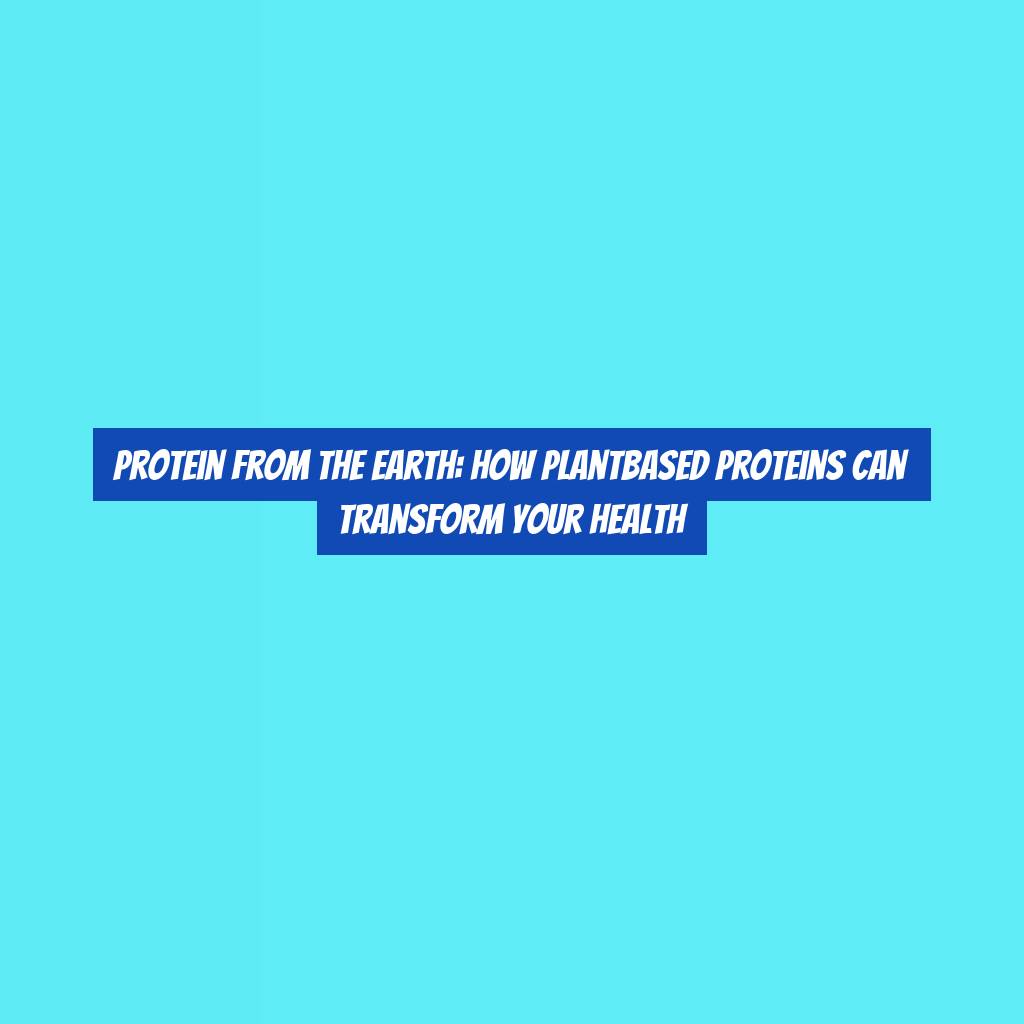Protein from the Earth: How PlantBased Proteins Can Transform Your Health
Looking to boost your health with a more mindful approach to nutrition? Plant-based proteins could be the key to unlocking a world of wellness.
With the rise in popularity of plant-based diets, the spotlight is now on the potential of these proteins to revolutionize your health. But how exactly can these earthy proteins transform your well-being?
LetG??s explore the science behind the benefits and the practical ways to incorporate them into your daily routine.
The Benefits of Plant-Based Proteins
Incorporating plant-based proteins into your diet can offer numerous health benefits. These include improved digestion, weight management, and reduced risk of chronic diseases.
Plant-based proteins, such as lentils, chickpeas, tofu, and quinoa, are rich in fiber. This fiber aids in digestion and helps maintain a healthy gut.
Unlike many animal proteins, plant-based proteins are generally lower in calories and saturated fats. This makes them a great option for weight management.
Additionally, these proteins are packed with essential nutrients and antioxidants. These have been linked to a reduced risk of heart disease, diabetes, and certain types of cancer.
Complete Proteins in Plant-Based Foods
YouG??ve just learned about the benefits of plant-based proteins, and now, letG??s explore the concept of complete proteins in plant-based foods. Complete proteins contain all nine essential amino acids that the body canG??t produce on its own. Contrary to popular belief, you can easily obtain complete proteins from plant-based sources by combining different foods.
Here are some examples of plant-based foods that are complete proteins:
-
Quinoa: This ancient grain isnG??t only a good source of protein but also packed with fiber and various nutrients.
-
Buckwheat: Despite its name, buckwheat isnG??t related to wheat and is naturally gluten-free, making it a great option for those with gluten sensitivities.
-
Soy: Foods like tofu, tempeh, and edamame are complete proteins and versatile ingredients for various dishes.
-
Chia seeds: These tiny seeds are rich in omega-3 fatty acids and can be added to smoothies, oatmeal, or used as an egg substitute in baking.
-
Hemp seeds: Hemp seeds are a nutritional powerhouse, containing not only complete proteins but also essential fatty acids and various minerals.
Plant-Based Proteins for Muscle Building
Looking to build muscle with plant-based proteins? YouG??re in luck! Contrary to common misconceptions, plant-based proteins can be just as effective for muscle building as animal-based proteins. Legumes like lentils, chickpeas, and black beans are excellent sources of protein and can aid in muscle recovery and growth. They also contain a good amount of fiber, which promotes a healthy digestive system and overall well-being.
Quinoa is another powerhouse plant-based protein that not only provides all nine essential amino acids but also offers a substantial amount of protein per serving. This makes it an ideal option for those looking to increase their protein intake for muscle building. Additionally, tofu and tempeh are great alternatives to meat, delivering a significant protein boost while being low in saturated fats.
DonG??t forget about nuts and seeds! Almonds, peanuts, chia seeds, and hemp seeds are rich in protein and healthy fats, making them a convenient and nutritious snack to support muscle growth. Incorporating a variety of these plant-based proteins into your diet can provide you with the essential nutrients needed to maximize muscle building and overall physical performance.
Plant-Based Proteins for Weight Management
DonG??t overlook the impact of plant-based proteins on weight management, as these protein sources can play a key role in supporting your overall health and fitness goals. Incorporating plant-based proteins into your diet can be a game-changer for weight management.
HereG??s why:
-
Satiety: Plant-based proteins such as legumes, tofu, and quinoa are rich in fiber, keeping you feeling full and satisfied, which can prevent overeating.
-
Lower Caloric Density: Many plant-based protein sources have lower caloric density than animal proteins, making it easier to manage your calorie intake for weight loss or maintenance.
-
Nutrient-Dense: Plant-based proteins are often packed with essential nutrients, providing your body with the fuel it needs while managing weight.
-
Healthy Fats: Some plant-based proteins, like nuts and seeds, offer healthy fats that can support weight management and overall health.
-
Digestive Health: Plant-based proteins can contribute to a healthy digestive system, aiding in better nutrient absorption and waste elimination.
Incorporating Plant-Based Proteins Into Your Diet
Incorporating plant-based proteins into your diet is an excellent way to enhance your overall health and nutrition. There are various delicious and nutritious options that can easily be integrated into your meals.
Legumes such as lentils, chickpeas, and black beans are great sources of plant-based protein and can be added to soups, salads, and stews.
Tofu and tempeh are versatile and can be used in stir-fries, sandwiches, or as a meat substitute in your favorite recipes.
Quinoa, chia seeds, and hemp seeds arenG??t only packed with protein but also provide essential omega-3 fatty acids and fiber. Adding these to your breakfast bowls, smoothies, or salads can boost your protein intake.
Nuts and nut butters are convenient snacks that offer a protein punch and can be spread on whole grain toast, mixed into yogurt, or added to oatmeal.
Additionally, incorporating plant-based protein powders into your smoothies or baking can be a convenient way to increase your protein consumption.
Conclusion
In conclusion, plant-based proteins offer numerous health benefits, such as muscle building and weight management.
With complete proteins found in various plant-based foods, itG??s easier than ever to incorporate them into your diet.
Whether youG??re looking to improve your overall health or achieve specific fitness goals, plant-based proteins can provide the nutrients and fuel your body needs.
So why not make the switch and start reaping the benefits of protein from the earth today?



